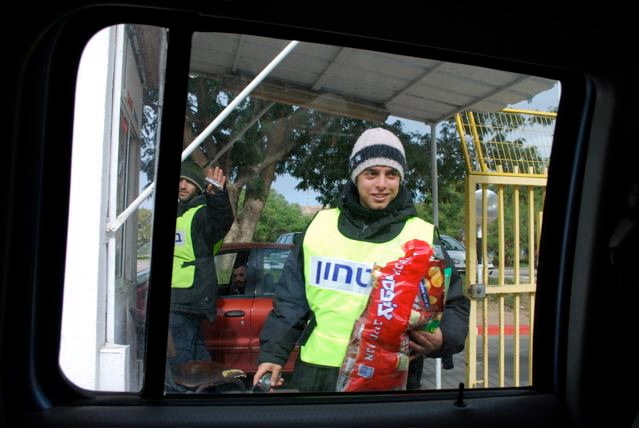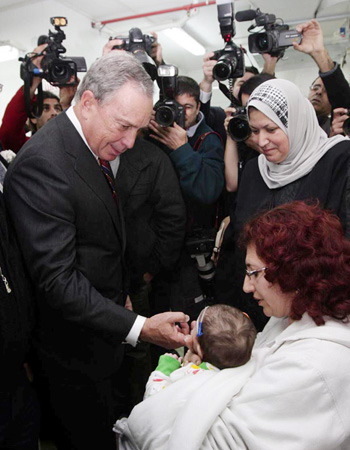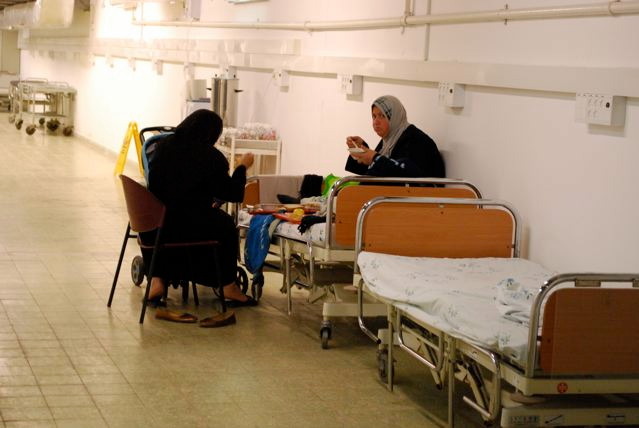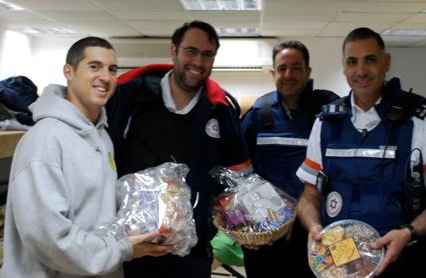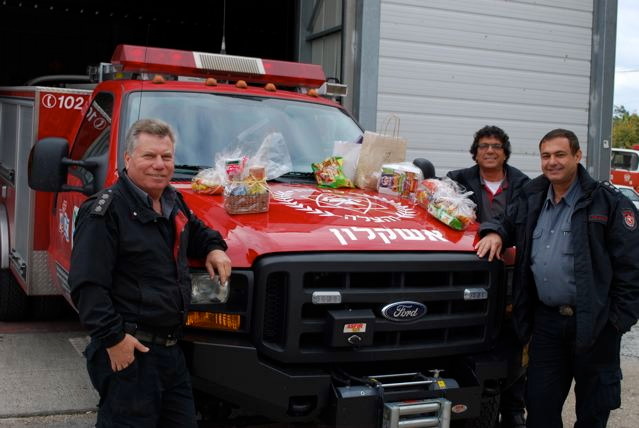First person: The Day Before Mayor Bloomberg’s Visit to Ashkelon
By Jordan B. Gorfinkel
Issue of Jan. 16, 2009 / 20 Teves 5769
A photo of New York City Mayor Michael Bloomberg visiting an Israeli hospital shows him being greeted with smiles by two women who are standing vigil over a little boy injured in Gaza. Here’s the hook: the women are Palestinian and I got a very different reaction when I photographed them in the exact same Ashkelon hospital basement the day before.
I arrived in Israel for a family simcha a few days before the IDF began its Gaza operation. (I have a knack for arranging my visits to Israel to coincide with armed conflicts, beginning with the first Gulf War and going right up to the last Lebanon War. Perhaps the secret to peace in the Middle East is to keep me away.)
My sister, Caryn, and brother-in-law, David, live in Modi’in and rallied Anglo friends to make up care packages to give out in the missile zone. (Did you know that in Israel both French fries and potato chips are called chips, European style? To differentiate, Israelis call potato chips “chatif,” which means, “something grabbed.” Soldiers who are taken hostage are called by the same term.)
Their neighbor, Brian, a Toronto émigré, volunteers to drive to Ashkelon but since he broke his shoulder playing football he needs someone to help lift the packages. I volunteer. Then my brother-in-law, David, joins us in the Brianmobile, a vintage 1998 van, and our trio motors south on Highway 3.
Fifteen minutes later in remarkably light traffic we are cruising past Ein Tzurim, which has been hit. Fifteen minutes from a suburb of Tel Aviv and we’re in missile range! Brian wonders if we should stop. David says we should reach our goal. I say we should drive on to Sderot. Clearly, Brian, David and I split along the classic lines of id, ego and superego.
Soon Ashkelon’s skyline is visible on the horizon. It’s a pretty town, with clean, modern buildings, palm trees — and a noticeable deficit of the usual mix of life: cars driving, people walking or waiting in bus stations — few of these things are to be seen. We pass an unpaved parking lot with ambulances parked, lights on, engines running... waiting... waiting. Brian sees something flying through the air and gasps. David says relax, it’s only an F-15. We drive on. Brian calms himself by drawing comparisons between Hamas leaders and the Godfather movie characters.
A few blocks and we’re pulling up to Barzelai Hospital. At the security barrier the young guard asks why we’re here. Do we have an appointment? No. Do we know the names of whom we’re visiting? Um, no. We do have lots of chatif, however. The guard peers in back. He waves us through.
We jump a curb and park on a dirt lot, next to the helipad, beyond which is a sweet view of the blue Mediterranean Sea. We gather up half of the bags of goodies and carry them into the hospital building. On the outside of every floor, in the center, we see numbered metal doors encased in solid concrete. Bomb shelters.
David perks up his ears. “Hear that?” he says. “It’s a siren.” To me, it sounds like an ambulance racing around deserted streets somewhere in the distance. We dismiss it collectively. Later we learn that the siren was indeed an air raid signal — the lack of Doppler effect should have tipped us off. The siren was for the south; here in Ashkelon, slightly north, rocket hits occurred a couple of hours before we arrived.
We enter the building and follow signs to the ER that inexplicably lead into the basement. We meet some attendants and explain our mission: we’re from Modi’in and bearing gifts. Grateful nurses and ER personnel accept our bundles of packaged food with smiles. They ask if we’d like to hand gifts personally to children. Of course!
A manager leads us on a circuitous path through deserted upper-floor hospital corridors, outdoors, and back inside into another building and downstairs again. We reason that, for security purposes, all essential hospital operations, from the ER to the children’s ward, have been moved into the basement.
We walk past two women wrapped head to toe in robes and scarves, save for their faces, feeding a small child in a stroller, and enter the children’s ward. The personnel here, mostly women, smile brightly and thank us for our gifts. The cribs are empty. A doctor explains that right now, there are only a couple of intakes.
We bid our good-byes and exit. I pass the two heavily robed women — the ebullient Palestinian women from Mayor Bloomberg’s picture. I hoist my camera and fire off a shot. They grunt and hold up their hands to protest. Too late.
We get back in the van and drive to the exit barrier. Brian’s as excited now, as he was anxious before. “The smiles, oy!” he says. His euphoria turns out to be as long lasting as a sprint to the bomb shelter. “We’ve been allowed to fulfill our mission,” Brian said darkly. “Now we’ll be hit.”
We make two other stops, the first to deliver the remaining care packages to the ambulance bay and the fire station next door. We can tell the first responders by their navy blue Kevlar vests. They’re on 24-hour shifts. Their job: to wait for something to happen.
The firefighters gladly pose for photos, and even set up a still life of food packages on the hood of their sparkling cherry red truck.
We also make a pit stop in Kiryat Malachi. Brian’s hungry, he wants a shwarma sandwich. But every restaurant on the block is shuttered. Only one store is doing business, the makholet (bodega). “I’m not afraid,” says the owner matter of factly. He steps into the rear of his two narrow aisles, fires up the hotplate and cooks Brian some lunch. A rare customer walks in to buy a paper, and laughs, “Yaakov, you’re a restaurant now?”
I’m glad we stopped in Kiryat Malachi. To spend time in the only open shop in town and talk with the only people who ventured outdoors; this resonated. Schools are closed and no one’s going to work. To go outside here is to risk your life — seriously. Fifteen minutes later we’re back in Modi’in.
My mind drifts to Mayor Bloomberg’s Palestinian women. They were not happy about me. Understandable — there’s certainly no love lost between their people and mine. When I look at my photograph, I see a very suspicious look. But I also see a lady eating her lunch. I ask myself, what if I’d stopped to engage this woman? Instead, I presumed animosity and did what I wanted. Did I bully her? Had I asked permission to photograph her, would I have gotten smiles, like Mayor Bloomberg? Maybe, maybe not. After a trip to the missile zone I’m left to wonder, what if I hadn’t taken the first shot?
...And where would we be if Hamas showed the same introspection?
Jordan B. Gorfinkel is a Jewish musician and cartoonist who began December performing at the White House and ended it in Israel.

 39.0°,
Fair
39.0°,
Fair 